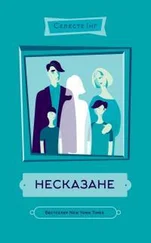Once she’d finished, she sat down with a pen and a piece of paper. She’d been thinking about what to say all the long drive from Pittsburgh, and in the end, she’d decided to lie. “There is no easy way to say this,” she wrote. “I lost the baby. I’m so ashamed and so sorry. You don’t owe me anything from our agreement, but I feel I owe you. Here is money to pay you back for the medical appointments. I hope it’s enough—it’s all I can spare.” She placed her note on top of a stack of bills—nine hundred dollars of her saved-up wages. Then she bundled them into the bag with the maternity dresses.
The regular doorman was off duty that night, and with Mia’s coat nestled around her, the night doorman didn’t seem to notice her belly. He accepted the parcel for the Ryans without once glancing at her face, and Mia headed back to the Rabbit, parked several blocks away. In her belly, the baby kicked once, then turned over, as if settling into sleep.
She drove all night, through New Jersey and Pennsylvania, miles of highway whipping by in the dark. As the sun began to rise, she turned off the highway just outside Erie and drove until she found a quiet rural road. Once she’d parked well off the roadside, she locked all the doors, climbed into the backseat, and wrapped herself in her old quilt. She’d expected it to smell like detergent, like home, and she braced herself for a whirl of nostalgia. But the quilt, having lain on her bed untouched for the past year, smelled like nothing—not clean, not dusty, no smell at all—and pulling it over her head to shield her eyes from the sun, Mia fell asleep.
All week she drove this way, as if in a fever: driving until exhaustion forced her to stop, sleeping until she was rested enough to drive again, ignoring the clock, the light and dark of each day. She stopped now and then, when she passed a town, to buy bread, peanut butter, apples, to refill the gallon jug in the passenger seat with water at a fountain. Throughout her belongings she had hidden two thousand dollars, saved up from her tips and wages since she’d come to New York: in the box of negatives, in the glove compartment, in the right cup of her bra. Ohio, Illinois, Nebraska. Nevada. And then, suddenly, the teeming swirl of San Francisco, the Pacific churning blue-gray and white before her, and she could go no further.

What else was there to know? Mia found an apartment, a room for rent in the Sunset in a house whose plaster was the color of sea salt, with a stern and elderly landlady who eyed her stomach and asked only, “There going to be an angry husband knocking on my door in a week?” For the last three months of her pregnancy, Mia walked the city, circling the lagoon in Golden Gate Park, climbing Coit Tower, one day crossing the Golden Gate Bridge in a fog so dense she could hear, but not see, the traffic rushing alongside her. The fog mirrored her state of mind so perfectly she felt as if she were walking through her own brain: a haze of formless, pervasive emotion, nothing she could grasp, but full of looming thoughts that appeared from nowhere, startling her, then receded into whiteness again before she was even sure what she had seen. Mrs. Delaney, her landlady, never smiled at her when they passed each other in the hallway, or when they happened to meet in the kitchen, but as the weeks went on, Mia would often come home to find a plate in the oven, a note on the counter that read Had leftovers. Don’t want to waste them.
When Pearl was born—on an unseasonably warm May afternoon, at the hospital, after fourteen hours of labor—Mia took the birth record card from the nurse. She had been thinking for months now about what to name this child, mentally combing through all the people she’d known, the books she’d read in high school. Nothing had seemed right until she remembered The Scarlet Letter, and the right name came to her at once: Pearl. Round, simple, whole as the peal of a bell. And, of course, born into complicated circumstances. Beside it, on the line for “Mother’s name,” she wrote, in neat letters, MIA WARREN. Then she’d reached into the bassinet beside her bed and taken her daughter into her arms.
The first night back in the rented room, Pearl had cried and cried until Mia herself had begun to cry. She wondered if, in New York City, the Ryans would still be awake in their gleaming apartment, what they would say if she lifted the phone and said to them, I lied. The baby is here. Come and get her. They would take the next flight and arrive at her door, she knew, ready to spirit Pearl away. She could not tell if the thought was terrible or tempting or both, and she and Pearl both wailed. Then there was a soft knock at the door, and stern Mrs. Delaney appeared and held out her arms. “Give her here,” she said, with such authority that Mia handed the soft bundle over without thinking. “Now you lie down and get some rest,” Mrs. Delaney said, shutting the door behind her, and in the abrupt silence Mia flopped down on the bed and fell instantly asleep.
When she woke, she came bleary-eyed into the kitchen, then into the living room, where Mrs. Delaney sat in a pool of lamplight rocking a sleeping Pearl.
“Did you rest?” she asked Mia, and when Mia nodded, she said, “Good,” and set the baby back into Mia’s arms. “She’s yours,” Mrs. Delaney said. “You take care of her.”
She spent the next few weeks in the same haze, but something had begun to shift. Mrs. Delaney never again came to take the baby away, no matter how hard Pearl cried, but in the evenings she would rap on the door with a bowl of soup, a cheese sandwich, a piece of meat loaf. Leftovers, she always claimed, but Mia understood the gift for what it was, and understood, too, when Mrs. Delaney followed these offerings with a gruff “Rent’s due Thursday” or “Don’t track mud into the hall,” what she was trying to say.
Pearl was three weeks old—still old-mannish, squash-faced—and the fog was just beginning to lift, when Mal’s phone call arrived.
Mia had sent Pauline and Mal a letter once she’d settled, with her new address and phone number. “I’m fine,” she told them, “but I won’t be coming back to New York. Here’s where you can reach me if you need to.” And now, Mal had needed to reach her. A few weeks ago, Pauline, it seemed, had started having headaches. Strange symptoms. “Auras,” said Mal. “She said I looked like an angel, with a halo all around me.” A scan had found a lump the size of a golf ball in her brain.
“I think,” Mal said, after a long pause, “if you want to see her maybe you should come right away.”
That evening, Mia booked a plane ticket, the second she’d ever bought. It took most of her savings, but a bus across the country would take days. Too long. She arrived at Pauline and Mal’s apartment with a knapsack slung over her shoulder and Pearl in her arms. Pauline, twenty pounds thinner, looked like a more concentrated version of herself: whittled down, somehow, pared down to her essence.
They spent the afternoon together, Mal and Pauline cooing over the baby, and Mia spending the night, for the first and last time, in their guest room with Pearl beside her. In the morning she woke early to nurse Pearl on the couch in the living room and Pauline came in.
“Stay,” Pauline said. Her eyes were almost feverishly bright, and Mia wanted to rise and fold Pauline into her arms. But Pauline waved her to sit and held up her camera. “Please,” she said. “I want to take both of you.”
She took a whole roll, one exposure after another, and then Mal came out with a pot of tea and a shawl for Pauline’s shoulders, and Pauline put the camera away. By the time Mia boarded the plane back to San Francisco that evening, Pearl in her arms, she had forgotten all about it. “Do what it takes,” Pauline had said to her as she had hugged her good-bye. For the first time, she had kissed Mia on the cheek. “I’m expecting great things from you.” Her use of the present tense—as if this were just an ordinary good-bye, as if she, Pauline, had every expectation of watching Mia’s career unfurl before her over decades—penned Mia’s voice in her throat. She had pulled Pauline close and breathed her in, her particular scent of lavender and eucalyptus, and turned away again before Pauline could see her cry.
Читать дальше













